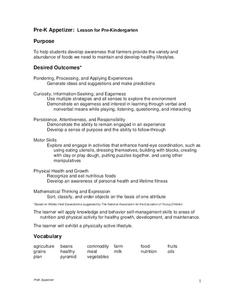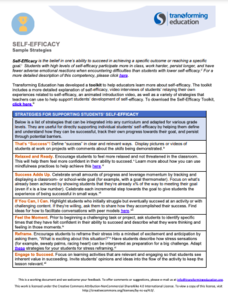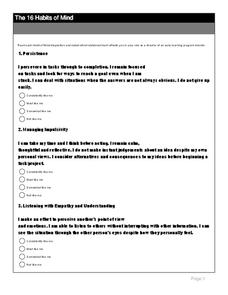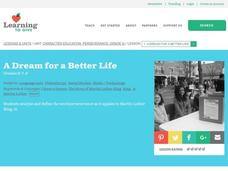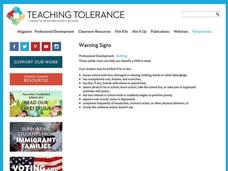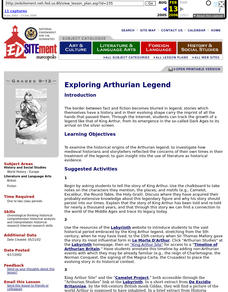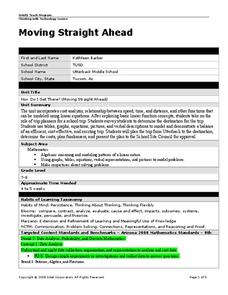Curated OER
Pre-K Appetizer
Students understand there are healthy and not healthy food choices. In this food pyramid lesson, students learn to make healthy choices by playing a traffic light game. Students recognize raw foods from the farm may not be ready for...
Transforming Education
Self-Efficacy Strategies
Scholars with high levels of self-efficacy perform better in school. Instructors review a list of strategies for enhancing self-efficacy skills. They discover how to teach learners to appropriately define success, celebrate progress, and...
New Jersey Historical Commission and New Jersey Council for the Humanities
Thomas Edison: The Wizard of Menlo Park
What would change in your daily life due to a power outage? Here, learners explore the inventions brought to us by the one and only, Thomas Edison, and imagine a day without them. Scholars take part in a grand conversation and write a...
Google
Art: Greeting Card
Greetings from your computer science class! The culminating activity in the eight-part Google CS Art unit has scholars create digital cards. The purpose of the cards is to show their families what they now know about programming.
Center School
The 16 Habits of Mind
Which of Costa's 16 Habit of Mind best describes you? Take a short assessment to see which quality is most consistently like you, or which quality is not like you at all.
Global Oneness Project
Flamenco: A Cross-Cultural Art Form
Notes of pride and persecution, exclusion and isolation resonate in flamenco. Introduce this musical art form to your social studies or Spanish language classes with a resource that follows a young flamenco guitarist as he...
Curated OER
Learning Lesson: How it is Currently Done
Learners create their own ocean currents by using everyday items. They examine the constant pushing of molecules that makes us feel wind. They discuss how the water moves in the Southern Hemisphere.
Curated OER
The Old North Trail
Students engage in a lesson to find information about the old trails of North America that were used by Native Americans. Specifically, they conduct research to find the history of The Old North Trail. The teacher shares several theories...
Curated OER
Who Do You See?
Students analyze portraits and decide on the most important aspects of their own personality. In this portraiture lesson, students identify feelings and emotions in the sitter and the creator of a portrait. After reading the poem "We...
Curated OER
Landscapes: Real and Imagined
Students examine three landscapes incorporating images from nature and the unconscious. In this art analysis instructional activity, students explore the artists' perception and impact on a subject. Students complete image based...
Curated OER
Character Education: Perseverance
Students analyze and define the word perseverance as it applies to Martin Luther King, Jr. In this Martin Luther King, Jr. lesson, students discuss the book 'I Have a Dream: The Story of Martin Luther King.' Students analyze the meaning...
Curated OER
The Economics of Horticultural Production
Learners examine how government programs and sustainable practices can affect farm profitability. In this agriculture lesson students complete several activities that include the prices of food and designing their own ecolabel.
Curated OER
Voicing Your Opinion
Ninth graders study the time period of Martin Luther. In this World History lesson plan, 9th graders create their own 95 Theses. Students compare their 95 Theses to that of Martin Luther.
Curated OER
The Pledge of Allegiance
Students explore the meaning of the Pledge of Allegiance. In this civics lesson, students examine the document, define related vocabulary words, and rewrite it in their words.
Curated OER
Wildlife Study Comparison
Pupils compare/contrast two studies that examine the effects of environmental contaminants on animals. They read an article, identify the components of a research study, summarize the article, and complete a matrix.
Curated OER
The Vision Quest
Fourth graders explore lives of Chief Plenty Coups and Crow Indians, focusing specifically on tradition of Vision Quests. Students identify reasons for Vision Quests, and create presentation to share information found with classmates.
Curated OER
Using Words to Work Things Out
Students explore appropriate ways to communicate feelings. In this character development lesson, students listen to Hands are not for Hitting and several other books about expressing emotions appropriately. Students observe...
Curated OER
The Gettysburg Address
Students explore the implications of the Gettysburg Address. In this Civil War lesson, students read a handout regarding Gettysburg Address, analyze an excerpt of the speech, and complete the provided worksheet activities.
Curated OER
Chemical and Physical Changes
Eighth graders investigate different gas behaviors. In this chemistry lesson, 8th graders describe how changing volume and temperature affect gas particles motion. They collect data and make a generalization about these variables'...
Curated OER
Warning Signs
Students identify the signs that someone is being bullied. In this school climate lesson, students discuss the provided list of signs that one is being bullied. Links are provided to other lessons about bullying.
Curated OER
Exploring Arthurian Legend
Pupils use the internet to track the growth of the King Arthur legend from the Dark Ages to its arrival on the silver screen.
Curated OER
FACS: Sanitation & Food - Support Services (HST)
Students discuss the importance of proper food handling and sanitation by workers to ensure health and wellness. After watching a demonstration, they discuss how importance hand washing is to stop the spread of disease. To end the...
Curated OER
Newton's Color Wheels
Students investigate the effects of light while experimenting with several color wheels. They make observations and record them. The information from the observations is used to help fuel the discussion that follows. The lesson includes...
Curated OER
Moving Straight Ahead
Pupils analyze the relationship between speed, time and distance. In this math instructional activity, students plan a school trip. Pupils determine the efficiency and cost effectiveness of a trip.
